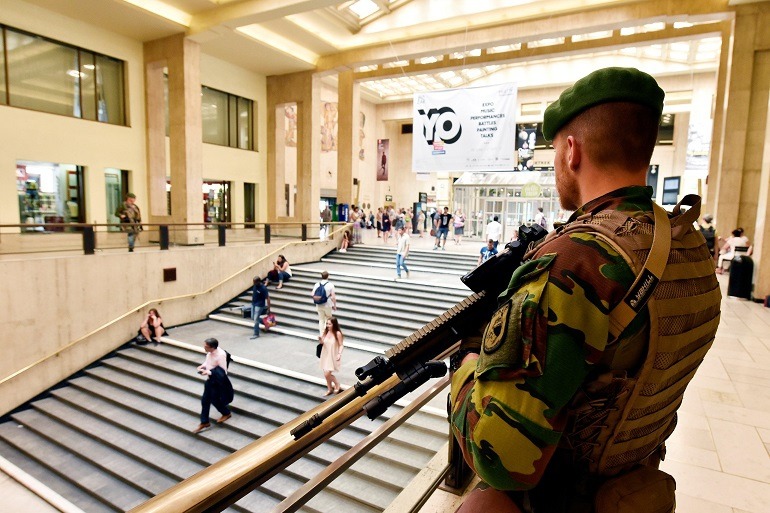Early in August, there was a scene of shocking familiarity in the centre of Brussels. Police shot at a car in a dramatic high-speed chase in the notorious district of Molenbeek after the driver shouted: “I have bombs!” The threat of an explosion brought back memories of March 2016 when terrorists in the city’s metro and airport killed 32 and injured scores. This time, however, it turned out to be a false alarm. The suspect, from Rwanda, was not carrying explosives in his German-registered Citroen Picasso: prosecutors later described him as "mentally unstable".
But the risk of further attacks is still real. In July, Interpol circulated a list of 173 Islamic State fighters it believes could have been trained to mount suicide attacks in Europe in revenge for the group’s military defeats in the Middle East. While there has been no repeat of the carnage of last year, there has been a series of incidents over the past 18 months, suggesting the terrorist menace has not gone away.
In June, an attempted suicide bomber screaming ‘Allahu Akbar’ triggered a bomb at the city’s Central Station before being gunned down and killed by soldiers. It was only his incompetence – his bomb failed to explode as planned – that saved innocents from his intended assault. In August last year, a machete-wielding man attacked two policewomen in Charleroi, before being shot dead. And in May this year, a 14-year-old girl from Uccle, Firdaous Bouhaltite Soulaïmane, disappeared, amid fears that she had been recruited to fight in Syria by the sister of one of the terrorists killed in Verviers in 2015.
Islamic terrorist incidents in other European cities, like London, Manchester, Berlin and Nice, show how vulnerable the continent still is. The most recent European atrocity, the Barcelona attack in August, actually had a Brussels connection, like many others before: the Imam suspected of masterminding it travelled to Belgium three months before the Brussels bombing and was friends with the 2004 Madrid train bombers.
Soldiers are still a fixture at transport hubs and in the main public areas since the November 2015 Paris attacks that killed 130 people. Their presence helps reassure a jittery public: at the end of 2016, some 81% of Belgians expressed confidence in their armed forces, up by 10% compared to 2015.
But there is an ongoing question of whether they should still be there after almost two years. Wally Struys, a professor at the Royal Military Academy in Brussels, says Belgium’s comfortable position at the core of the European system has led it to dramatically neglect its own state apparatus. In a report for Egmont, Belgium’s Royal Institute for International Relations, in June, he warned that the security of citizens on national territory is a matter for the police, and “the presence of soldiers on the streets is as much use as a poultice on a wooden leg.”
Nor have the Belgian authorities done much to show that they are on top of the situation. In June, a 500-page report from a parliamentary inquiry revealed that an understaffed security apparatus and outdated legal restrictions prevented the arrests of the main assailants ahead of the 2015 Paris and 2016 Brussels attacks. The report said Belgian police, intelligence and judicial services failed to share crucial leads and bungled opportunities to dismantle the terror network in time, including analysing contents of phones, and laptops seized during a February 2015 house search of the Abdeslam brothers, who were involved in the Paris attacks.
This ties in with a report earlier this year by the European Foundation for Democracy (EFD) and the Counter Extremism Project (CEP) that looked at the links in Molenbeek between social exclusion and radicalization, which warned that “the current terrorist threat does not allow for any nonchalance at all”. The report, authored by Pieter Van Ostaeyen and Guy Van Vlierden said that while Belgium stands well ahead of other countries in the prosecution of jihadist terrorists – prosecutions in 2015 represented about 60% of all people tried in the 12 member states for which data was available - only 5% of all terrorists convicted since 2014 were in jail as of July 2016.
This is partly because many of those brought to trial were convicted in absentia, but also due to lenient sentencing and what the report says is the “shocking reality” that “certain parts of the Belgian judiciary are not yet convinced of the seriousness of the terrorist threat.” The authors said that even when there are indications that a convict has committed beheadings in Syria, there are judges who would let such a person walk free while awaiting appeal. “In our opinion, this amounts to a criminal neglect of the duty to protect society,” they said.
So, what is still to be done to clear the lingering terrorist strains from Belgium? Van Ostaeyen and Van Vlierden offer a few suggestions. These include:
- Building preventative measures, like specific training for police, social workers, teachers etc and programmes aimed at including disaffected citizens;
- Working with social media companies to fight online radicalisation;
- Working to engage Muslim communities;
- Addressing popular fears over the current refugee influx by making clear that the overwhelming majority of migrants have no bad intentions whatsoever;
- Taking even the slightest indications of terrorist intent seriously by not allowing any room for leniency.
Their warnings, and the indications over the past two years, suggest that the terrorist threats are still there. If there have been no major recent incidents in Belgium, it is as much down to luck as it is to vigilance. But even if Belgians are breathing a little more easily, it is too early to let their guard down.
By Leo Cendrowicz

